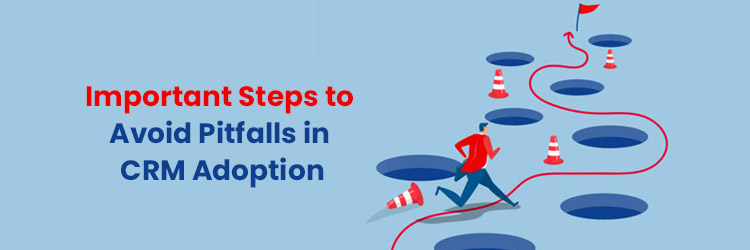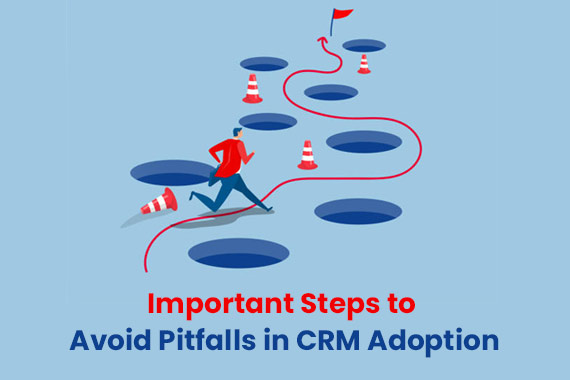Important Steps to Avoid Pitfalls in CRM Adoption

Customer Relationship Management(CRM) has emerged as a valuable tool for organizations that desire enhanced customer interaction, a more streamlined sales process, and improved growth. But implementing a CRM is not possible without risks. Most companies face pitfalls that make it difficult for them to gain maximum benefit from their CRM.
CRM implementation assists companies in avoiding typical pitfalls by providing a seamless process. In this blog, we will examine some of the typical CRM pitfalls and steps on how to avoid them.
Table of Contents
- #1 Pitfall: Lack of Clear Objectives
- #2 Pitfall: Choosing the Wrong CRM Software
- #3 Pitfall: Inadequate Training and Support
- #4 Pitfall: Lack of User Adoption
- #5 Pitfall: Poor Data Management
- #6 Pitfall: Over-Customization
- #7 Pitfall: Neglecting Mobile Accessibility
- #8 Pitfall: Failing to Integrate with Other Systems
- #9 Pitfall: Ignoring Data Privacy and Compliance
- #10 Pitfall: No Ongoing Strategy
- Make CRM Success a Reality with Matebiz
- FAQ
#1 Pitfall: Lack of Clear Objectives
Applying a CRM without setting clear objectives and a defined strategy may result in disorientation and misalignment. Without a quantifiable goal, it would be hard to measure the success of the implementation.
Solution:
Begin by determining what you wish to accomplish—whether more sales, improved customer retention, or efficient communication. Establish quantifiable goals and establish KPIs (Key Performance Indicators) so you can measure your CRM’s performance from the start. Begin by implementing a SMART- Specific, Measurable, Achievable, Relevant, and Time-bound strategy.
#2 Pitfall: Choosing the Wrong CRM Software
Not all CRMs are equal. Some are better suited for small businesses, and others are for big corporations. Choosing a CRM without regard to your business size, industry needs, or scalability will result in confusion and unnecessary cost.
Solution:
Conduct extensive research and compare the CRM system according to your current and future requirements. Consider features such as ease of use, integration options, adaptation features and customer support. Wherever possible, choose a demo or test before taking a final decision.
#3 Pitfall: Inadequate Training and Support
Certain businesses anticipate that employees will “figure it out” on the fly. This can contribute to abuse, mistakes, and frustration, decreasing the efficiency of the CRM.
Solution:
Offer regular training sessions specific to various departments. Create concise user guides, FAQs, and support channel access. Foster a learning and improvement culture to establish long-term CRM expertise.
#4 Pitfall: Lack of User Adoption
A robust CRM is only effective if team members use it in a consistent manner. Low user adoption is one of the most pervasive challenges that CRM systems face, resulting from inefficient training or a lack of value. If the users perceive that the system is complex, adoption rates will remain low.
Solution:
Clearly communication of the benefits of the CRM system to employees makes it easier and more efficient to apply CRM. Provide training on hands and make encouragement for better use. Gathering feedback and acting on it encourages a greater engagement level.
#5 Pitfall: Poor Data Management
Data quality is the foundation on which successful CRM systems are created. Implementing old, duplicate or irrelevant data can make the system ineffective. This would lead to inaccurate reporting or wasted sales efforts.
Solution:
Cleansing your data before migration is the essential step. Standardize data entry formats and establish rules for updating records. Assign data ownership to ensure accountability and maintain data hygiene on a regular basis.
#6 Pitfall: Over-Customization
Although customization is required to configure a CRM system to suit a particular business, over-customization can result in complexity. This becomes difficult to manage and update with the increased costs.
Solution:
Stick to the essential customizations initially. As soon as the users become comfortable and business needs evolve, gradually adding features enhances the functionality. Keep the interface clean and intuitive by creating dashboards that showcase the metrics and information.
#7 Pitfall: Neglecting Mobile Accessibility
With the on-the-road and remote work culture of the present, a non-mobile CRM system limits flexibility and productivity among field agents and sales forces.
Solution:
Make sure your CRM has a mobile app that is responsive or a browser-based interface. It must enable users to update leads, view client information, and schedule meetings anywhere, anytime. According to Nucleus Research, mobile CRM increases productivity by 14.6% and sales conversion rates by up to 15%, proving the need for CRM mobility.
#8 Pitfall: Failing to Integrate with Other Systems
A CRM that has no interaction with other software applications can interrupt process efficiency and generate data silos. Other programs, including e-mail marketing campaigns, ERP or accounting software systems, may become complicated with other business applications.
Solution:
Choose a CRM that supports end-to-end integration with the tools your team is willing to adopt. This will offer a streamlined flow of information and deliver a 360-degree view of customer touch points in all channels.
#9 Pitfall: Ignoring Data Privacy and Compliance
With data privacy rules like GDPR and CCPA, it is more important to maintain data privacy in the CRM system than ever. Failing to follow data privacy rules can cause legal issues, financial penalty and damage to the company’s reputation.
Solution:
Customer data is to be protected at all costs. The business has to ensure that its CRM system is fully compliant with all data privacy laws. Be sure that you are articulate about your legal ground for processing the customer data, be transparent with your data handling practices, and give your pledge of privacy.
#10 Pitfall: No Ongoing Strategy
CRM implementation is not a one-off project. Without a long-term plan, businesses can lag behind on updates, miss new features, or allow user engagement to decline.
Solution:
Create a CRM plan with quarterly check-ins, user feedback cycles, and regular training boosters. Monitor new tech trends and developments from your CRM vendor to be ahead of the game.
Make CRM Success a Reality with Matebiz
Rolling out a CRM system is a big undertaking that, if done right, can change the way you manage customer relationships and business growth. By keeping these common pitfalls at bay, you can set your business up for long-term CRM success.
Matebiz Pvt. Ltd is India’s top digital marketing company offering its services in Australia, New Zealand, the USA, and more. We provide you with end-to-end CRM consulting services that ensure your system aligns perfectly with your business goals. From choosing the right software to staff training and ongoing optimization, we make sure CRM adoption is smooth and result-driven.
Make your CRM investment work smarter for you and don’t let these avoidable mistakes hold your business back!
FAQ
What is CRM adoption?
CRM adoption is the extent to which a company’s processes and employees accept and utilize effectively a Customer Relationship Management system.
Should I customize my CRM heavily from the start?
No, begin with necessary customizations. Customizing too much too soon may complicate the system and make it more difficult to handle.
What role does Matebiz play in CRM adoption?
Matebiz assists companies in selecting, deploying, tailoring, and optimizing CRM solutions for seamless adoption and improved ROI.
FACT TIME!
In 2025, some HR teams are using CRM systems to track employee moods through pulse surveys—just like tracking customer satisfaction—making workplace vibes as measurable as sales leads!

Vish C
Recent Blogs
-
 Important Steps to Avoid Pitfalls in CRM Adoption
Important Steps to Avoid Pitfalls in CRM Adoption
-
 Mobile EMR App Development: A New Era in Healthcare Delivery
Mobile EMR App Development: A New Era in Healthcare Delivery
-
 How to Get Started With Answer Engine Optimisation (AEO)
How to Get Started With Answer Engine Optimisation (AEO)
-
 What Are Google’s E-E-A-T Principles: Building Trust for AEO Success
What Are Google’s E-E-A-T Principles: Building Trust for AEO Success
-
 How to Choose the Right IT Outsourcing Partner: Key Criteria to Consider
How to Choose the Right IT Outsourcing Partner: Key Criteria to Consider


